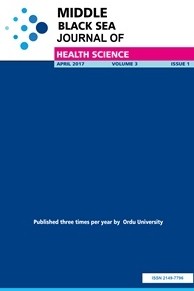Investigation of the Effectiveness of Cl-Amidine on Wound Healing: An In Vitro Study
Investigation of the Effectiveness of Cl-Amidine on Wound Healing: An In Vitro Study
Peptidyl arginine deiminase (PAD) Cl-Amidine, Wound healing, HaCat keratinocyte cell line,
___
- Jones JE, Causey CP, Knuckley B, Slack-Noyes JL, Thompson PR. Protein arginine deiminase 4 (PAD4): Current understanding and future therapeutic potential. Curr Opin Drug Discov Devel. 2009; 12(5): 616-27.
- Chen CC, Isomoto H, Narumi Y, Sato K, Oishi Y, Kobayashi T, Yanagihara K, Mizuta Y, Kohno S, Tsukamoto K. Haplotypes of PADI4 susceptible to rheumatoid arthritis are also associated with ulcerative colitis in the Japanese population. Clin Immunol. 2008; 126: 165–171.
- Moscarello MA, Mastronardi FG, Wood DD. The role of citrullinated proteins suggests a novel mechanism in the pathogenesis of multiple sclerosis. Neurochem Res. 2007; 32: 251–256.
- Ishigami A, Ohsawa T, Hiratsuka M, Taguchi H, Kobayashi S, Saito Y, Murayama S, Asaga H, Toda T, Kimura N, Maruyama N. Abnormal accumulation of citrullinated proteins catalyzed by peptidylarginine deiminase in hippocampal extracts from patients with Alzheimer's disease. J Neurosci Res. 2005; 80: 120–128.
- Chang X, Han J, Pang L, Zhao Y, Yang Y, Shen Z. Increased PADI4 expression in blood and tissues of patients with malignant tumors. BMC Cancer. 2009; 9(40): 1-11.
- Vossenaar ER, Zendman AJ, van Venrooij WJ, Pruijn GJ. PAD, a growing family of citrullinating enzymes: genes, features and involvement in disease. Bioessays. 2003; 25(11): 1106-1118.
- Chang X, Han J. Expression of peptidylarginine deiminase type 4 (PAD4) in various tumors. Mol Carcinog. 2006; 45(3):183-96.
- Schellekens GA, de Jong BA, van den Hoogen FH, van de Putte LB, van Venrooij WJ. Citrulline is an essential constituent of antigenic determinants recognized by rheumatoid arthritis-specific autoantibodies. J Clin Invest. 1998; 101: 273–281.
- Luo Y, Arita K, Bhatia M, Knuckley B, Lee YH, Stallcup MR, Sato M, Thompson PR. Inhibitors and Inactivators of Protein Arginine Deiminase 4: Functional and Structural Characterization. Biochemistry, 2006; 45 (39): 11727–11736.
- Cau L, Takahara H, Thompson PR, Serre G, Méchin M, Simon M. Peptidylarginine Deiminase Inhibitor Cl-Amidine Attenuates Cornification and Interferes with the Regulation of Autophagy in Reconstructed Human Epidermis. J Invest Dermatol. 2019; 139(9): 1889-1897.
- Fredrikkson C. Keratinocytes in tissue engineering of human skin: in vitro and in vivo studies. Ġsveç: Linköping University. 2008.
- Shaw TJ, Martin P: Wound repair at a glance. J Cell Sci. 2009; 122: 3209-3213.
- Sgonc R, Gruber J. Age-related aspects of cutaneous wound healing: A mini-review. Gerontology. 2013; 59: 159-164.
- Carmicheal J, DeGrafit WG, Gazdar AF, Minna JD, Mitchell JB. Evaluation of tetrazolium-based semiautomated colorimetric assay: Assasment of chemosensivity testing. Cancer Research. 1987; 47: 936-942.
- Engür-Öztürk S, Dikmen M. Proteasome inhibitor immunotherapy for the epithelial to mesenchymal transition: assessing the A549 lung cancer cell microenvironment and the role of M1, M2a and M2c ‘hydrocortisone-polarised’macrophages. Molecular Biology Reports. 2022; 49(6): 4777-4793.
- Yuksel SN, Dikmen M, Canturk Z. Evaluation of Real Time Cell Proliferation, Anti-Inflammatory and Wound Healing Potential of Helenalin on HaCaT Keratinocytes Treated with Lipopolysaccharide Stimulated Monocytes. Indian Journal of Pharmaceutical Sciences. 2021; 83(2); 219-229.
- Safferling K, Sütterlin T, Westphal K, Ernst C, Breuhahn K, James M, Jäger D, Halama N, Grabe N. Wound healing revised: A novel reepithelialization mechanism revealed by in vitro and in silico models. Journal of Cell Biology. 2013; 203(4): 691-709.
- Evans ND, Oreffo ROC, Healy E, Thurner PJ, Man YH. Epithelial mechanobiology, skin wound healing, and the stem cell niche. Journal of the Mechanical Behaviour of Biomedical Materials. 2013; 28: 397-409.
- Diegelmann RF, Evans MC. Wound healing: an overview of acute, fibrotic and delayed healing. Frontiers in Bioscience. 2004; 9: 283-289.
- Sandt J, Roguet R, Cohen C, Esdaile D, Ponec M, Corsini E, Barker C, Fusenig N, Liebsch M, Benford D, Fraissinette AB, Fartasch M. The use of human keratinocytes and human skin models for predicting skin irritation. Alternatives to Laboratory Animals. 1999; 27: 723-743.
- Ranzato E, Patrone M, Burlando B. Platelet lysate stimulates wound repair of HaCaT keratinocytes. British Journal of Dermatology. 2008; 159: 537-545.
- Yayın Aralığı: Yılda 4 Sayı
- Başlangıç: 2015
- Yayıncı: Ordu Üniversitesi
Doğu Karadeniz Bölgesi Erişkin Popülasyonda Ankete Dayalı Besin Alerji Prevelansı
Handan DUMAN, Adile Berna DURSUN
What Impact does a Pandemic have on Emergency Department Visits? COVID-19 Pandemic and Coronaphobia
Muhammet Fatih BEŞER, Engin İLHAN, Perihan ŞİMŞEK, Metin YADIGAROGLU, Abdul Samet ŞAHİN, Emre KOÇ, Esra ÜÇÜNCÜ, Özlem BÜLBÜL, Demet SAĞLAM AYKUT, Özgür ARAZ, Murat TOPBAŞ, Abdulkadir GÜNDÜZ
Fatma TANILIR ÇAĞIRAN, Zercan KALI
Determining University Students' Anxiety and Problem Solving Skills in the COVID-19 Pandemic Process
Ülkü SAYGILI DÜZOVA, Abdullah VURGUN, Güler KARA, Gülnihal PARLAK
Machine Learning Approach for Thyroid Cancer Diagnosis Using Clinical Data
İpek BALIKÇI ÇİÇEK, Zeynep KÜÇÜKAKÇALI
Feyza AKTAŞ REYHAN, Elif DAĞLI
Investigation of Postgraduate Theses on Using of Web-Based Education in Nursing Education
Osman Eren ÇETİNKAYA, İlke ÖZER ASLAN, Alev KURAL, Keziban DOĞAN
Investigation of the Effectiveness of Cl-Amidine on Wound Healing: An In Vitro Study
